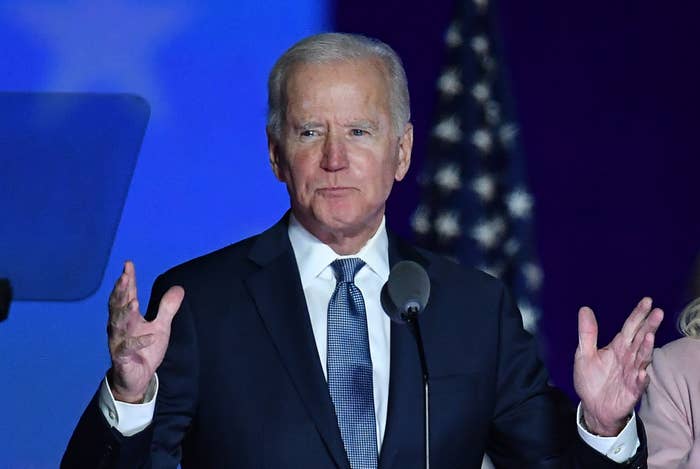President Joe Biden threatened on Thursday to condition support for Israel’s offensive in Gaza on it taking concrete steps to protect aid workers and civilians, seeking for the first time to leverage U.S. aid to influence Israeli military behavior.
Biden’s warning, relayed in a call with Prime Minister Benjamin Netanyahu on Thursday, followed a deadly Israeli attack on World Central Kitchen aid workers that spurred new calls from Biden’s fellow Democrats to place conditions on U.S. aid to Israel. Israel said the attack was a mistake.
The U.S. president, a lifelong supporter of Israel, has resisted pressure to withhold aid or halt the shipment of weapons to the country. His warning marked the first time he has threatened to potentially condition aid, a development that could change the dynamic of the nearly six-month-old war.
Biden “made clear the need for Israel to announce and implement a series of specific, concrete, and measurable steps to address civilian harm, humanitarian suffering, and the safety of aid workers,” the White House said of the leaders’ phone call. It said the call lasted about 30 minutes.
The president “made clear that U.S. policy with respect to Gaza will be determined by our assessment of Israel’s immediate action on these steps,” the White House said in a statement.
Washington is Israel’s top weapons supplier and the Biden administration has mostly provided a diplomatic shield for it at the United Nations.
At a briefing after the call, White House spokesperson John Kirby declined to elaborate on any specific changes the U.S. would make in its policy toward Israel and Gaza.
He said Washington hoped to see an announcement of Israeli steps in the “coming hours and days.”
By suggesting a shift in U.S. policy toward Gaza was possible if Israel did not address the humanitarian situation in the Palestinian enclave, Biden channeled his own frustration along with mounting pressure from his left-leaning political base in the Democratic Party to stop the killings and alleviate hunger among innocent civilians.
Asked about possible changes in U.S. policy, Netanyahu spokesperson Tal Heinrich told Fox News: “I think it’s something that Washington will have to explain”.
Later, the White House welcomed moves by Israel to open the Ashdod port and Erez crossing to increase deliveries of humanitarian assistance and to step up deliveries from Jordan directly into Gaza.
But these steps, said White House spokesperson Adrienne Watson, “must now be fully and rapidly implemented.”
On Monday, Israel launched an attack that killed seven workers with the World Central Kitchen group, founded by celebrity chef Jose Andres. Andres told Reuters in an interview on Wednesday that the Israeli attack had targeted his aid workers “systematically, car by car.
Israel said on Thursday that it would adjust tactics in the Gaza war after describing the attack as the result of a misidentification and that inquiry findings would be made public soon.
The White House had described Biden as outraged and heartbroken by the attack but, prior to Thursday’s call, the president had made no fundamental change in Washington’s steadfast support for Israel in its conflict against Palestinian Hamas militants.
During the call, Biden “underscored that an immediate ceasefire is essential to stabilize and improve the humanitarian situation and protect innocent civilians,” the White House said. Biden urged Netanyahu to empower his negotiators to conclude a deal to bring home hostages captured by Hamas in its deadly Oct. 7 attack that triggered the Israeli offensive, it added.
In Brussels, U.S. Secretary of State Antony Blinken said Israel “must meet this moment” by surging humanitarian assistance and ensuring the security of those who provide aid.
“If we don’t see the changes that we need to see, there’ll be changes in our policy,” Blinken told reporters.
A U.S. official said the threat of policy changes applied only to the U.S. demand that Israel do more to protect and aid civilians but not to Biden’s urgency for a ceasefire.
‘LAST STRAW’
Islamist fighters of the Palestinian militant group Hamas attacked Israel on Oct. 7, killing 1,200 people and seizing 253 hostages, according to Israeli tallies.
Israel retaliated by imposing a total siege on Gaza, then launching an air and ground assault that has killed more than 33,000 Palestinians, say health authorities in Hamas-ruled Gaza.
Biden, who has described himself as a Zionist, supported Israel staunchly in the early days of its retaliation.
But as the Gaza death toll rose and the war widened with new fronts in Lebanon and Yemen, his administration began pushing for a ceasefire and humanitarian aid access. Last month, the U.S. abstained from a United Nations Security Council vote demanding a ceasefire, drawing Israeli anger.
Biden also faces deep Democratic anger over his handling of the Gaza war, a dynamic that could depress support for him in November’s election contest against Republican former President Donald Trump.
(Reuters)




















